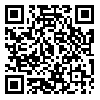Volume 15, Issue 11 (1-2016)
Modares Mechanical Engineering 2016, 15(11): 17-25 |
Back to browse issues page
Download citation:
BibTeX | RIS | EndNote | Medlars | ProCite | Reference Manager | RefWorks
Send citation to:



BibTeX | RIS | EndNote | Medlars | ProCite | Reference Manager | RefWorks
Send citation to:
Ebrahimi A, Akbarzadeh S, Vaezpour A R. Study on the effect of surface roughness pattern on the thermoelastic instability in lubricated sliding surfaces. Modares Mechanical Engineering 2016; 15 (11) :17-25
URL: http://mme.modares.ac.ir/article-15-11128-en.html
URL: http://mme.modares.ac.ir/article-15-11128-en.html
Abstract: (4749 Views)
The different kinds of sliding surfaces like clutches, and breaks are susceptible to a surface damage called thermoelastic instability. Instability refers to the unlimited growth turbulence of temperature and pressure, leading to very high local temperatures and wear on the hot spots. In this research, the effect of surface texture on the thermoelastic instability is investigated under mixed lubrication regime. For this purpose, a model consisting of a surface with high thermal conductivity and a rough surface with low thermal conductivity is considered. To this work, a computer program is employed to numerically generate three different surface roughness patterns i.e. transverse, longitudinal, and isotropic. Then the flow factors which are correction factors to the Reynolds equation for considering the surface roughness pattern are employed to study the effect of surface pattern on the thermoelastic instability.. To do this work, An algorithm is developed to regenerate the thermoelastic instability results in the published literature and then is used to find the critical speed for three types of surface patterns beyond which thermoelastic instability leading to the formation of hot spots is likely to occur. Finally it is shown that the critical speed for longitudinal surface pattern is higher than two other surface patterns and then there are isotropic and transversal surface patterns respectively.
Received: 2015/05/12 | Accepted: 2015/08/8 | Published: 2015/09/30
| Rights and permissions | |
 |
This work is licensed under a Creative Commons Attribution-NonCommercial 4.0 International License. |







